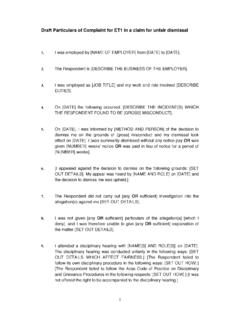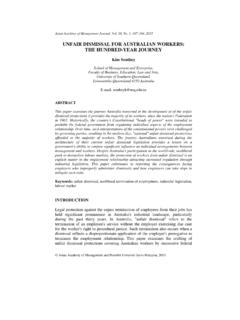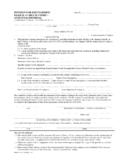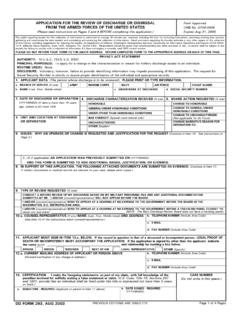Transcription of How do you determine a fair sanction? Dismissal as ...
1 49 How do you determine a fair sanction? Dismissal as appropriate sanction in cases of Dismissal for (mis)conduct*Nicola SmitBLC LLB LLDP rofessor of Law, University of Johannesburg and Co-Director of CICLASSOPSOMMINGHoe Word n Billike Sanksie Bepaal? Ontslag as Gepaste Sanksie in Gevalle van Ontslag weens (Wan)gedrag Elke werknemer in Suid Afrika het die reg om nie onbillik ontslaan te wordnie. Die Wet op Arbeidsverhoudinge 66 van 1995 bepaal dat n werkgewer nwerknemer billik mag ontslaan op grond van gedrag, vermo opbedryfsvereistes. Die werkgewer moet egter ook n billike prosedure voorontslag volg. Die Kode van Goeie Praktyk: Onbillike Ontslag (bylae 8 by dieWet) bepaal dat die vraag of n rede vir ontslag billik is of nie, word deur diefeite van elke saak asook die gepastheid van ontslag as sanksie beantwoord(in besonder item 7(b)(iv)). Dit is egter nie maklik om te bepaal of ontslag diegepaste sanksie in n bepaalde geval is nie.
2 Hierdie bydrae oorweeg hierdievraag sonder om na prosedurele billikheid te verwys. In die saak van EdconLtd v Pillemer NO (Reddy) is beklemtoon dat n werkgewer getuienis moetvoorl om die bewering dat ontslag in werklikheid die gepaste sanksie was, teondersteun. Sodanige getuienis kan insluit dat die vertrouensverhoudingonherstelbare skade gely het. Die werkgewer moet dus kan aandui dat diewerknemer skuldig is aan wangedrag en dat die aard sowel as die impak ofuitwerking daarvan sodanig is dat ontslag die gepaste sanksie is. Die bydraeondersoek n aantal sake in die lig van hierdie oorweging, naamlik: (i) diebewyslas in ontslaggeskille; (ii) wanneer ontslag n gepaste sanksie kan wees;(iii) die finale besluitnemer rakende of ontslag billik was of nie (maw was ditin die bepaaalde geval wel die gepaste sanksie); en (iv) hoe moet nwerkgewer die besluit om ontslag as sanksie te gebruik of nie vrae word telkens bespreek met verwysing na beginsels wat reeds inregspraak gevestig Introduction 1 1 BackgroundEvery employee in South Africa has a right not to be unfairly an employee proves that he or she was dismissed,2 in the case ofdismissals that are not automatically unfair,3 the employer may establishthat the Dismissal was effected for a fair reason, after following a fair1S 185 of the Labour Relations Act 66 of 1995 (LRA).
3 2 See s 186 dismissals are listed in s 187 LRA.*Another version of this contribution was presented at the 23rd AnnualLabour Law Conference Justice on the Job held from 2011-08-11 at theSandton Convention 2011 De Section 188 of the Act provides that if a Dismissal is notautomatically unfair, it is unfair if the employer fails to prove that thedismissal is for a fair reason related to the employee s conduct orcapacity or based on the employer s operational requirements, and thatthe Dismissal was effected in accordance with a fair TheCode of Good Practice: Unfair Dismissal6 notes that whether or not areason for Dismissal is a fair reason is determined by the facts of eachcase and the appropriateness of Dismissal as a It is the latterenquiry that has proven particularly This contribution willnot consider the procedural fairness of a Dismissal .
4 I discuss only themore limited issue of the fairness of Dismissal as a sanction, given thatthe employer has established the existence of Ltd v Pillemer NO (Reddy)10 emphasised that an employermust put forward evidence to sustain the allegation that Dismissal was infact an appropriate sanction. This would require evidence, for example,that the trust relationship between the employer and employee hadbroken down. Put differently, an employer can dismiss fairly if it canprove that there was a transgression, the nature as well as the effect orimpact of which was such as to make the sanction of the rest of this paper the following issues will therefore beconsidered: i) The onus of proof in Dismissal disputes; ii) when dismissalcould be an appropriate sanction; iii) the final decision regarding whetheror not Dismissal was fair (ie whether it was in fact the appropriatesanction); and iv) how to approach the decision whether to imposedismissal as sanction or not.
5 1 2 Edcon CaseIn Edcon Ltd v Pillemer NO11 Reddy was the user of a company vehicle,a Toyota Corolla, courtesy of Edcon s car scheme policy. In June 2003,Reddy s son was involved in an accident. In terms of the company carpolicy, Reddy was obliged, amongst other things, to report the accident4 See again s 192 LRA Onus in Dismissal disputes . 5 The fair reasons for Dismissal recognised by s 188 LRA originate in Art 4 ofthe International Labour Organization (ILO) Convention on the Terminationof Employment 158 of 8 item 7(b)(iv).8 Grogan Dismissal , Discrimination and Unfair Labour Practices (2005) 226states that the choice of the word appropriate reflects the difficulty thatcourts have experienced in deciding whether Dismissal or some lessersanction should be imposed for a case of proven decision in Avril Elizabeth Home for the Mentally Handicapped vCommission for Conciliation, Mediation and Arbitration 2006 27 ILJ 1644(LC) had far-reaching consequences for managing discipline in theworkplace as it stressed the need for more informal discipline (unlessotherwise stipulated in companies disciplinary codes).
6 10 [2010] 1 BLLR 1; 2009 30 ILJ 2642 (SCA).11 [2010] 1 BLLR 1 (SCA). Determining a fair sanction 51to Edcon, the South African Police Service and the relevant insurancecompany within 24 hours and not carry out repairs on the motor vehiclewithout the approval of the insurance company. Reddy did not complywith these policy regulations, did not report it and instead arranged withher husband to do repairs at his panel beating shop at own cost. Edcondiscovered this when the motor vehicle started to give problems and theToyota dealership detected the damage. Reddy initially denied that themotor vehicle had been involved in a collision whilst driven by her butlater came clean in her final statement. In due course Edcon convened adisciplinary enquiry to look into the matter and charged Reddy with failure to be honest and act with integrity in that you committed an act,which has affected the trust relationship between the company and theemployee in that on 8 June 2003 to 8 October 2003, you failed to reportan accident of a company vehicle.
7 12 She was found guilty anddismissed from her that her Dismissal was unfair, Reddy referred a dispute tothe second respondent, the CCMA who appointed the first respondent( Pillemer ) to arbitrate the dispute after conciliation failed. Pillemermade an award in which she concluded that Reddy s Dismissal wassubstantively unfair and ordered Edcon to reinstate her but withoutarrear salary. The commissioner found that failure to report the accidentwas in itself insufficient to warrant Dismissal , but that the crucial issuewas whether the employee s subsequent lack of candour had breachedthe trust relationship, as the presiding officers of the disciplinary andappeal hearing had The commissioner did not regard thesanction of Dismissal fair because of the circumstances of the matter, theemployee's length of service (43 years), her previous unblemished recordand the fact that the employee was only two years away from was unhappy with the award and contended that thecommissioner had not appreciated the extent of the employee sdishonesty.
8 Edcon further contended that the commissioner had erredby having regard to hearsay evidence, and that the company had ledsufficient evidence to prove a breakdown of the trust relationship andlaunched review proceedings in the Labour Court in terms of section 145of the Act. The Labour Court declined to set the award aside andaccordingly Edcon appealed to the Labour Appeal Court with that court sleave. The Labour Appeal Court dismissed the appeal, concluding that theaward was unassailable. The Supreme Court of Appeal reviewed the history of the various testsapplied by the courts in applications to review and set aside arbitrationawards, up to and including the judgment of the Constitutional Court inSidumo v Rustenburg Platinum Mines It noted that the earlier test12 Idem par paras 8 and [2007] 12 BLLR 1097 (CC). In the internal disciplinary hearing Mr Sidumowas charged as follows: Negligence Failure to follow establishedcontinued on next page52 2011 De Jurerequiring a rational connection between the material properly beforethe arbitrator and the decision reached had been replaced with a testrequiring an inquiry into whether the award is one that a reasonabledecision-maker could arrive at considering the material placed beforehim/her.
9 The court observed, interestingly, that the standard of reasonableness confirmed by the Sidumo case15 is conceptually thesame as the earlier rationality test, the only difference being semantic. On the merits, the court held that the only issue was whether thematerial before the commissioner was sufficient to prove that the trustrelationship between the employee and the company had beendestroyed. The court noted that the company s only witness had merelyrecounted developments in the investigation of the matter. He could notand did not testify on the effects of the employee s conduct on the trustrelationship. Not only was the commissioner obliged to find that therewas no evidence to conclude that the trust relationship had beendestroyed, but she had also correctly taken into account the employee syears of service and clean disciplinary record.
10 Accordingly, the appealwas The employee must establish the existence of the On theother hand, the employer must prove that the Dismissal is Thereis no shift of the burden of proof from one party to the other in In a Dismissal dispute each party bears the burden of proof inrelation to separate issues (ie the employee regarding the fact of14 procedures in terms of the Protection Services Department searchprocedure which caused prejudice or possible prejudice to the Company interms of production loss and Failure to follow established procedures interms of the Protection Services Department search procedures. S 192(1) S 192(2) In the context of automatically unfair Dismissal the following has beenraised - in Janda v First National Bank [2006] 12 BLLR 1156 (LC) Van Zyl AJheld: This essential point is obscured if one speaks of the employee mustprove or a shifting of the onus or a duty to establish a prima facie casethat the reason for the Dismissal was an automatically unfair one.)















